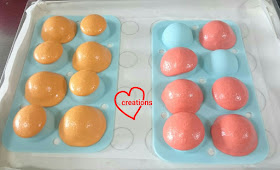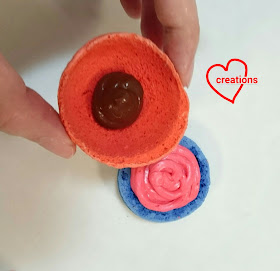Here's a closer look at the 3D shells!
I made these hemispherical shells or shells with a hole in the middle because I had leftover batter one day and decided to play around with it, fully expecting it to fail. But to my pleasant surprise, it worked! You can't imagine my excitement when I successfully unmoulded the shells!
I shall not go into detail for the basic macaron recipe or basic techniques as they are the same for 3D shells. I will focus on the technique of creating these 3D shells instead and anything to take note of when baking and unmoulding these shells.
I used the regular recipe for the macaron shells. Both regular and reduced sugar recipes can be found here. You may refer to my Creative Baking: Macarons book for a systematic presentation of the basics and complex shaped macarons. You may refer to my video tutorials for macaron basics and piping of complex shapes on the blog too.
As it is my first attempt at making 3D shells, they are still not that neat so pardon the weird shaped shells.
There are two types of 3D features that I explored in my experiment.
The first type of 3D feature is a cup-shaped or hemispherical shell. I used silicone cakepop mould as the surface to pipe the shells on. Piping it neatly is a challenge as the batter will flow down the sides of the hemisphere and there is no way to estimate precisely how much batter to pipe. Perhaps practice will make perfect? :P
See the hat shaped one above? The batter spread out more at the base.
The second type of 3D feature involves creating a hollow at the base of the shell, such that it forms a bridge-like structure. In order to create the hollow, I roll up a small piece of baking sheet and pipe the batter over it. Be careful not to let the edge of the paper come into contact with the piped batter or it will be impossible to unmould it cleanly.
In order to create a "handle on a lid" pop-up feature, I let the base shell dry partially (dry until almost not sticky to touch) before carefully placing the roll of baking sheet on it and piping the "hump" on top.
In order to create the larger bridge structure, first stick the roll of baking sheet onto the baking sheet on the baking tray. Next, pipe the batter over it.
Regular macaron shells (about 4-5cm diameter) may take about 17-25 minutes to bake. These hemispherical shells on silicone moulds take longer, about 30-40 minutes to be fully baked. Underbaked shells are impossible to unmould without breaking them. Be sure to use a lower temperature of 110-115°C to bake the shells after the initial 12-15 minutes of baking to prevent browning.
When unmoulding the shells from baking sheet or silicone mould, wait for it to cool completely, then do it very, very gently and carefully. Always peel the baking sheet/silicone mould away from the shell and not the other way round.
Check out the freshly baked shells!!
I decorated the shells with royal icing. Stiffer icing was used for the teeth and horns.
I filled the shells with Neapolitan filling - vanilla, strawberry and dark chocolate ganache.
Recipe for vanilla/strawberry/dark chocolate ganache
Ingredients:
Vanilla:
100g white chocolate, chopped
10g unsalted butter
10g vegetable shortening
28g heavy cream
1/4 tsp fine sea salt
1 tsp vanilla bean paste
Strawberry:
100g white chocolate, chopped
10g unsalted butter
10g vegetable shortening
28g heavy cream
1/8 tsp fine sea salt
1 tsp strawberry emulco
1/4 tsp rose water (optional)
Dark chocolate:
120g dark chocolate, chopped
10g unsalted butter
3g vegetable shortening (may replace with butter)
40g heavy cream
1/8 tsp fine sea salt
1/2 tsp vanilla bean paste
Steps:
1. Place chopped chocolate, butter and vegetable shortening in a microwave-safe bowl. Heat at medium power for 20 seconds. Use a spatula to mix well. Repeat until mixture is smooth and melted.
2. Place cream in small saucepan. Heat until it starts to bubble. Pour over melted chocolate mixture and stir in one direction with a spatula until smooth.
3. Add fine sea salt and vanilla/strawberry paste. Mix well.
4. I like to whip up my ganache so it's lighter in texture but this is optional. You may let the mixture stand at room temperature until it firms up to toothpaste consistency. Alternatively, refrigerate for several minutes before beating mixture with spatula. Return to fridge for another 3-4 min and beat the mixture again. If it's not as light and fluffy as you prefer it to be, return to the fridge one last time for another 3-4 min and beat again.
5. Transfer to piping bag and fill the shells.
When filling hemispherical shells, be careful when you assemble as the filling may fall out. Quickly assemble top and bottom shells together to prevent this from happening.
Filling hemispherical shell with dark chocolate....
...followed by vanilla white chocolate
I used sour gummy candies for the tongue and arms.
Here's a close up view of my only tiny monster hiding in a jar!
Store assembled macarons in fridge for at least 24h before serving. Let the macarons stand at room temperature for about 15 minutes before consuming.
I had fun with the 3D shells :). Hopefully there will be more inspiration and ideas on what to do with these.
With love,
Phay Shing














Omg these are AMAZING!!!
ReplyDeleteThank you!
Delete